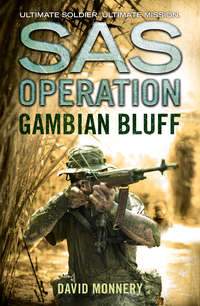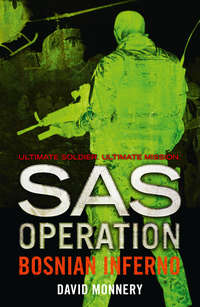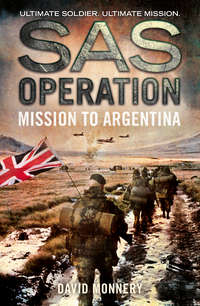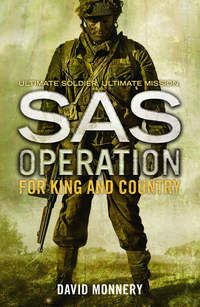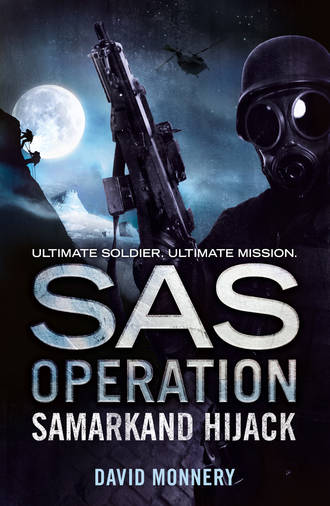
Полная версия
Samarkand Hijack
And here he was.
Two Uzbek women were walking towards him, both clothed head to foot in the Muslim paranca, eyes glinting behind the horsehair mesh which covered their faces. There was something so graceful about them, something so beautiful. Nasruddin turned his eyes away, and found himself remembering the pictures in Playboy which he and the others had studied so intently in the toilets at school. He watched the two women walking away, their bodies swaying in the loose black garments. When English friends had argued with him about such things he had never felt certain in his heart of the rightness of his views. But at this moment he did.
Not that it mattered. He had always been certain that the other way, the Western way, the obsession with sex, could never work. It had brought only grief in its wake – broken families, prostitution, rape, sexual abuse, AIDS…the list was endless. Whatever God expected of humanity, it was not that. In the words of one of his favourite songs as a teenager, that was the road to nowhere.
And whatever befell him and the others over the next few days, he had no doubt that they were on the right road.
He made his way slowly back to the hotel, arriving in time to supervise the boarding of the tour bus for the two-hour ride to Shakhrisabz. He watched with amusement as they all claimed the same places they had occupied that morning and the previous afternoon, and idly wondered what would happen to anyone daring enough to claim someone else’s.
Now that the dice were cast he felt, somewhat to his surprise and much to his relief, rather less nervous than he had.
Docherty also registered the guide’s change of mood, but let it slip from his mind as the views unfolding through the bus window claimed more and more of his attention. They were soon out of Samarkand, driving down a straight, metalled road between cherry orchards. Groups of men were gathered in the shade, often seated on the bed-like platforms called kravats.
‘Do you think they’re waiting for the cherries to ripen?’ Docherty asked Isabel.
‘I doubt it,’ she said. ‘The women probably do all the picking.’
‘Aye, but someone has to supervise them,’ Docherty argued.
She pinched the back of his neck.
The orchards soon disappeared, giving way to parched fields of grain. As the road slowly rose towards the mountains they could see the valley of the Zerafshan behind them, a receding strip of vegetation running from east to west in a yellow-brown sea, the domes of Samarkand like blue map pins in the green swathe.
‘What do you know about Shakhrisabz?’ Isabel asked.
‘Not a lot,’ Docherty said. ‘It was Tamerlane’s home town – that’s about all.’
‘There’s the ruins of his palace,’ Mike Copley volunteered, open guide book in his lap. ‘It says the only thing left is part of the entrance arch, but that that’s awesome enough.’
‘The son of a bitch didn’t do anything by halves,’ Sam Jennings commented. ‘I was reading in this’ – he held up the paperback biography – ‘about his war with the Ottoman Turks. Do you want to hear the story?’ he asked, with the boyish enthusiasm which seemed to make light of his years.
‘Go on, educate us,’ Copley told him.
‘Well, the Ottoman Turks’ leader Bayazid was just about to take Constantinople when a messenger from Tamerlane arrives on horseback. The message, basically, says that Tamerlane is the ruler of the world, and he wants Bayazid to recognize the fact. Bayazid has heard of Tamerlane, but thinks he’s just another upstart warlord. His guys, on the other hand, are the military flavour of the month. The whole of Europe’s wetting itself in anticipation, so he can hardly believe some desert bandit’s going to give him any trouble. He sends back a message telling Tamerlane to go procreate himself.
‘A few weeks later the news arrives that Tamerlane’s army is halfway across Turkey. Bayazid’s cheesed, but realizes he has to take time out to deal with the upstart, and he leads his two hundred thousand crack troops across Anatolia to meet Tamerlane. When the armies are a few miles apart the Turks get themselves in formation and wait. At which point Tamerlane’s army hits them from every conceivable side. A few hours later Bayazid is on his way to Samarkand in a cage. And the Turkish conquest of Constantinople gets put back fifty years, which probably saves the rest of Europe from Islam.’
The American smiled in pleasure at his story.
‘I think it’s a shame the way someone like Tamerlane gets glorified,’ his wife said. ‘In Samarkand he’s becoming the new Lenin – there are statues everywhere. The man turned cities into mountains of skulls, for God’s sake. He can’t be the only hero the Uzbeks have in their past.’
‘He wasn’t an Uzbek,’ Charles Ogley said, his irritable voice floating back from the front seat. ‘None of the Uzbeks’ heroes are. Nawaii, Naqshband, Avicenna. The Uzbeks didn’t get here until the end of the fifteenth century.’
Docherty, Mike Copley and Sam Jennings exchanged glances.
‘So who was here before them, Professor?’ Copley asked.
‘Mostly other Turkic peoples, some Mongols, probably a few Arabs, even some Chinese. A mixture.’
‘Maybe countries should learn to do without heroes,’ Sarah Holcroft said, almost defiantly.
‘Sounds good to me,’ Alice Jennings said.
Ogley’s grunt didn’t sound like agreement.
There were few signs of vegetation now, and fewer signs of farming. A lone donkey tied to a roadside fence brayed at them as they went past. The mountains rose like a wall in front of the bus.
The next hour offered a ride to remember, as the bus clambered up one side of the mountain range to the six-thousand-foot Tashtakaracha Pass, and then gingerly wound its way down the other. On their left were tantalizing glimpses of higher snow-capped ranges.
‘China’s on the other side of that lot,’ Copley observed.
They arrived at Shakhrisabz soon after three-thirty. ‘The name means “green city”,’ Nasruddin told them, and it did seem beautifully luxuriant after the desert and bare mountains. The bus deposited them in a car park, which turned out to occupy only a small part of the site of Tamerlane’s intended home away from home, the Ak Saray Palace. It would have been bigger than Hampden Park, Docherty decided.
As Copley’s book had said, all that remained of the edifice was a section of wall and archway. The latter, covered in blue, white and gold mosaics, loomed forty metres into the blue sky. Awesome was the word.
The other sights – another blue-domed mosque, a couple of mausoleums, a covered market – all paled in comparison. At around five-thirty, with the light beginning to take on a golden tinge, they stopped for a drink at the Ak Saray café. ‘We’ll leave for Samarkand in twenty minutes,’ Nasruddin said, before disappearing back outside.
The tourists sipped their mint tea and watched the sun sliding down over the western desert horizon. As the jagged-edged tower of Tamerlane’s gateway darkened against the yellow sky Docherty felt at peace with the world.
He smiled across the table at Isabel. Twelve years now, he thought, twelve years of the sort of happiness he hadn’t expected to find anywhere, let alone behind enemy lines in Argentina during the Falklands War.
It was an incredible story. At the beginning of the war Isabel, an exiled opponent of the Junta living in London, had agreed to return home as a spy, her love of country outweighed by hatred of its political masters. Docherty had been the leader of one of the two SAS patrols dropped on the mainland to monitor take-offs from the Argentinian airfields, and the two of them had ended up escaping together across the Andes into Chile, already lovers and more than halfway to being in love. Since then they’d married and had two children, Ricardo and Marie, who were spending these ten days with Docherty’s elder sister in Glasgow.
Isabel had made and mostly abandoned a career in compiling and writing travel guides, while Docherty had stayed on in the SAS until the early winter of 1992. Pulled out of retirement for the Bosnian mission a month later, his second goodbye to the Regiment in January 1993 had been final. Now, eighteen months later, the couple were preparing to move to Chile, where she had the offer of a job.
Chile, of course, was a long way from anywhere, and they had decided to undertake this Central Asian trip while they still could. It hadn’t been cheap, but it wasn’t that expensive either, considering the distances involved. The collapse of the Soviet Union had presumably opened the way for young entrepreneurs to compete in this market. Men like Nasruddin, Docherty thought, and idly wondered where their tour operator and guide had got to.
Nasruddin had crossed the road to the car park, and walked across to where two cars, a Volga and a rusting Soviet-made Fiat, were parked side by side under a large mulberry tree. There was no one in the cars, but behind them, in the circle of shade offered by the tree, six men were sitting cross-legged in a rough circle. Four of them were dressed modern Uzbek-style in cotton shirts, cotton trousers and embroidered skullcaps, but the other two were wearing the more traditional ankle-length robes and turbans.
As Nasruddin appeared the men’s faces jerked guiltily towards him, as if they were a bunch of schoolboys caught playing cards behind the bicycle sheds. Recognition eased the faces somewhat, but the tension in the group was still palpable.
‘Everything is going as expected,’ Nasruddin told them, squatting down and looking across the circle at Talib Khamidov. His cousin gave him a tight smile in return, which did little to soften the lines of his hawkish face.
‘They all came?’ Akbar Makhamov asked anxiously, ‘the Americans too?’ Despite Nasruddin’s assurances the others had feared that the two septuagenarians would sit out the side-trip to Shakhrisabz.
‘Yes. I told you they would come.’
‘God is with us,’ Makhamov muttered. The bearded Tajik was the other third of the group’s unofficial ruling triumvirate. He came from a rich Samarkand family, and like many such youths in the Muslim world, had not been disowned by his father for demonstrating a youthful excess of religious zeal. His family had not objected to his studying in Iran for several years, and on his return in 1992 Akbar had been given the prodigal son treatment. Over the last year, however, his father’s patience had begun wearing a little thin, though nothing like as thin as it would have done had he known the family money was being spent on second-hand AK47s and walkie-talkies for a mass kidnapping.
‘Everyone knows their duties?’ Nasruddin asked, looking round the circle.
They all did.
‘God be with us,’ Nasruddin murmured, getting to his feet. He caught Talib’s eyes once more, and took strength from the determination that he saw there.
He walked back to the tour bus, and found the driver behind his wheel, smoking a cigarette and reading one of the newly popular ‘romantic’ graphic novels. Nasruddin was angered by both activities, but managed to restrain himself from sounding it.
‘I told you not to smoke in the bus,’ he said mildly.
Muran gave him one contemptuous glance, and tossed the cigarette out through his window.
‘We’ll be picking up two more passengers on the way back,’ he told the driver. ‘A couple of cousins of mine. Just on the other side of Kitab. I’ll tell you when we get there.’
Muran shrugged his agreement.
Nasruddin started back for the café, looking at his watch. It was almost six o’clock. As he approached the tables the Fiat drove out of the car park and turned up the road towards Samarkand, leaving a cloud of dust hanging above the crossroads.
The group was ready to go, and he shepherded them back across the car park and into the bus, wondering as he did so which of them might make trouble when the time came. The ex-soldier and the builder looked tough enough, but neither seemed the sort to panic and do something stupid. Ogley was too fond of himself to take a risk, and the American was too old. Though neither he nor his wife, Nasruddin both thought and hoped, seemed the type to drop dead with shock.
Muran started up the bus, and Nasruddin sat down in the front folding seat. Once out on the road he sat staring ahead, half listening to the murmur of conversation behind him, trying to keep calm. He could feel a palpitation in his upper arm, and his heart seemed to be beating loud enough for everyone in the bus to hear.
He glanced sideways at the driver. There was a good chance the man would take the hundred American dollars and make himself scarce. But even if Muran went to the authorities, it wouldn’t matter much.
Nasruddin took a deep breath. Only ten minutes more, he told himself. It was almost dark now, and the fields to left and right were black against the sky’s vestigial light. Ahead of them the bus’s headlamps laid a moving carpet of light on the asphalt road. In the wing mirror he had occasional glimpses of the lights of the following car.
They entered the small town of Kitab, and passed families sitting outside their houses enjoying the evening breeze. In the centre a bustling café spilled its light across the road, and the smell of pilaff floated through the bus.
Nasruddin concentrated on the road ahead as they drove out through the northern edge of the town. A hundred metres past the last house he saw the figures waiting by the side of the road.
‘Just up here,’ he told Muran.
Docherty’s head had begun to drop the moment they started the return journey, but the jerk of the bus as it came to a halt woke him up. His eyes opened to see two men climbing aboard, each with a Kalashnikov AK47 cradled in his arms. A pistol had also appeared in Nasruddin’s hand.
The three men seemed to get caught up in one another’s movements in the confined space at the front of the bus, but this almost farcical confusion was only momentary, and all three guns were squarely pointed in the passengers’ direction before anyone had time to react.
A variety of noises emanated from the passengers, ranging from cries of alarm through gasps of surprise to a voice murmuring ‘shit’, which Docherty recognized as his own.
2
A stunned silence had settled on the tour party.
‘Mr and Mrs Ogley,’ Nasruddin said politely, ‘please move to the empty seats in the back.’
The academics stared at him for a moment, as if unable to take in the instruction. Nasruddin nodded at them, like a teacher trying to encourage a child, and they responded with alacrity, moving back down the aisle of the bus as if their lives depended on it. Elizabeth sat down next to Brenda Walker, while Charles took the single seat across the aisle from her.
Docherty was examining the two men holding the assault rifles. Both were in their late twenties or early thirties, and both, to judge by the slight body movements each kept making, were more than a little nervous. One wore a thin, dark-grey jacket over a white collarless shirt, an Uzbek four-sided cap and black trousers. His hair was of medium length and he was clean-shaven. Dark, sunken eyes peered out from either side of a hooked nose. His companion was dressed in a black shirt and black trousers, and wore nothing on his head. His hair was shorter, his Mongoloid face decorated with a neat beard and moustache.
‘I don’t suppose I need to tell you all that you have been taken hostage,’ Nasruddin begun. Then, as if realizing that he was still talking to them like a tour guide, the voice hardened. ‘You will probably remain in captivity for several days. Provided you obey our orders quickly and without question, no harm will come to any of you…’
There was something decidedly unreal about being taken hostage in Central Asia by a Pakistani with a Yorkshire accent, Docherty thought.
‘We do not wish to harm anyone,’ Nasruddin said, ‘but we will not hesitate to take any action that is necessary for the success of this operation.’ He looked at his captive audience, conscious of the giant step he had taken but somehow unable to take it in. It felt more like a movie than real life, and for a second he wondered if he was dreaming it all.
‘Can I ask a question?’ Mike Copley asked.
‘Yes,’ Nasruddin said, unable to think of a good reason for saying no.
‘Who are you people, and what do you want?’
‘We belong to an organization called The Trumpet of God, and we have certain demands to make of the Uzbekistan government.’
‘Which are?’
Nasruddin smiled. ‘No more questions,’ he said.
‘Can we talk to each other?’ Mike Copley asked.
The bearded hijacker spoke sharply to Nasruddin – in Tajik, Docherty thought, though he wasn’t sure. Their guide smiled and said something reassuring back. Docherty guessed that neither of the new arrivals spoke English.
‘You can talk to the people next to you,’ Nasruddin announced, deciding that conversation would do no harm, and that enforcing silence might be interpreted as a sign of weakness. ‘But no meetings,’ he added. He turned to Talib and Akbar, and explained his decision in Uzbek.
‘So what shall we talk about?’ Isabel asked Docherty in Spanish. She sounded calm enough, but he could hear the edge of tension beneath the matter-of-fact surface.
‘Some ground rules,’ he said in the same language. The two of them were used to conversing in her mother tongue, and at home often found themselves slipping between Spanish and English without thinking about it.
‘OK,’ she agreed. ‘Number one – you don’t try playing the hero. You’re retired.’
‘Agreed. Number two – don’t you try arguing politics with them. These don’t strike me as the kind of lads who like being out-pointed by women.’
‘That doesn’t make them very unusual,’ she said, putting her eyes to the window. ‘Where do you think they’re taking us?’
‘Somewhere remote.’ Docherty was watching Nasruddin out of the corner of his eye, thinking that he would never have suspected the man of pulling a stunt like this. He suddenly remembered something his friend Liam had said the last time he’d seen him, that the more desperate the times, the harder it was to recognize desperation.
He turned his attention back to his wife’s question. They seemed to be travelling mostly uphill, and the road was nowhere near as smooth as they were used to. He tried to remember the map of Central Asia he had examined before the trip, but the details had slipped from his mind. There were mountains to the east of the desert, and Chinese desert to the east of the mountains. Which wasn’t very helpful.
He thought about leaning across the aisle and asking to borrow Mike Copley’s guide book, but decided that would only draw attention to its existence and his own curiosity. Better to wait until they reached their destination, wherever that might be.
He turned round to look at Isabel, and found her angrily wiping away a tear. ‘I was just thinking about the children,’ she said defiantly.
He took her hand and grasped it tightly. ‘It’s going to work out OK,’ he said. ‘We’re going to grow old together.’
She smiled in spite of herself. ‘I hope so.’
Diq Sayriddin plucked a group of sour cherries from the branch above the kravat, and shared them out between the juice-stained hands of his friends. ‘I have to go inside for a while,’ he told them.
It was fifty-five minutes since he had received the call from Shakhrisabz at the public telephone in Registan Street. Nasruddin had expected him to make his own call from there, but somehow the place seemed too exposed. He had decided to use his initiative instead.
Sayriddin passed through the family house and out the back, climbed over the wall and walked swiftly down the alley which led to Tashkent Street. His father, as always, was sitting outside the shop in the shade, more interested in talking with the other shopkeepers than worrying about prospective customers. Sayriddin slipped round the side of the building and let himself in through the back door.
The whole building was empty – no one stayed indoors at this hour of the day – and the office was more or less soundproof, but just to be on the safe side he wedged the door shut with a heavy roll of carpet. Exactly an hour had now gone by since the call from Talib – it was time to make his own.
He pulled the piece of paper with the number, name and message typed on it from his back pocket, smoothed it out and placed it on the desk beside the telephone. He felt more excited than nervous, but perhaps they were the same thing.
After listening for several seconds to make sure he was alone, he picked up the receiver and dialled the Tashkent number. It rang once, twice, three times…
‘Hello,’ an irritable voice said.
‘I must speak with Colonel Muratov,’ Sayriddin said. His voice didn’t sound as nervous as he had expected it would.
‘This is Muratov. Who are you?’
‘I have a message for you…’ Sayriddin began.
‘Who are you?’ Muratov repeated.
‘I cannot say. I have a message, that is all. It is important,’ he added, fearful that the National Security Service chief would hang up.
There was a moment’s silence at the other end, followed by what sounded like a woman speaking angrily.
‘What is this message?’ Muratov asked, almost sarcastically.
‘The Trumpet of God group…’ Sayriddin began reading.
‘The what?!’
‘The Trumpet of God group has seized a party of Western tourists in Samarkand,’ Sayriddin said, the words tumbling out in a single breath. ‘They were with the “Blue Domes” tour, staying at the Hotel Samarkand. There are twelve English and two Americans among the hostages…’
Muratov listened, wondering whether this was a hoax, or simply one of his own men winding him up. Or maybe even one of the Russians who had been jettisoned when the KGB became the NSS. It didn’t sound like a Russian though, or a hoax.
‘Who the fuck are The Trumpet of God?’ he asked belligerently.
‘I cannot answer questions,’ Sayriddin said. ‘There is only the message.’
‘OK, give me the message,’ Muratov said. Who did the bastard think he was – Muhammad?
‘There are eight men and six women,’ Sayriddin continued. ‘All will be released unharmed if our demands are met. These will be relayed to you, on this number, at eleven o’clock tomorrow morning. Finally, The Trumpet of God does not wish this matter publicized. Nor, it believes, will the government. News of a tourist hijacking will do damage to the country’s tourist industry, and probably result in the cancellation of the Anglo-American development deal’ – Sayriddin stumbled over this phrase and repeated it – ‘the Anglo-American development deal…which is due to be signed by the various Foreign Ministers this coming Saturday…’
Whoever the bastards were, Muratov thought, they were certainly well informed. And the man at the other end of the line was probably exactly what he claimed to be, just a messenger.
‘Is that all clear?’ Sayriddin asked.
‘Yes,’ Muratov agreed. ‘How did you get my private number?’ he asked innocently. His answer was the click of disconnection.
In the office of the carpet shop Sayriddin was also wondering how Nasruddin had got hold of such a number. But his second cousin was a resourceful man.
He placed the roll of carpet back up against the wall, and let himself out through the back door.
In the apartment on what had, until recently, been Leningrad Street, Bakhtar Muratov sat for a moment on the side of the bed, replaying in his mind what he had just heard. He was a tall man for an Uzbek, broadly built with dark eyes under greying hair, and a mat of darker hair across his chest and abdomen. He was naked.
His latest girlfriend had also been undressed when the phone first rang, but now she emerged from the adjoining bathroom wearing tights and high-heeled shoes.
‘I’m going,’ she said, as if expecting him to demand that she stay.
‘Good,’ he said, not even bothering to look round. ‘I have business to deal with.’


